Category — Practicing Imperfection
Group therapy
A friend of mine invited me to attend a Write Around Portland writing work shop this morning. It was in response to a comment I’d made about how much I love writing. So I felt like maybe I should try the exercise in group writing, and not run away and cry in the corner, remembering the decades of rejection that I have stored in the back of my consciousness from other group writing experiences.
Seventh grade English, for example. Or college.
I chose Business as a major, yes because it was a “marketable degree†but also because it was one of two majors that didn’t require the writing of a thesis.
Law School was fine when I was able to write by formula, but the heartbreak that came from undeveloped ideas and half-formed theories tossed onto a page and desperately rearranged in an attempt to make something, anything coherent still makes me cringe when I think about group writing and the feedback process.
But I’m not one to run from discomfort.  Oh no.  So I put my little laptop in my bike bag, knowing that I’d probably have to write by hand, but wanting a reminder of my new, comfortable writing near me.
I walked into the back room of the restaurant where the group was meeting a couple of minutes late. I smiled at my friend, and grabbed a cup of coffee, pastry and a journal.
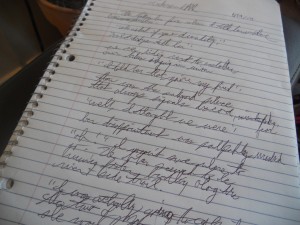
The little spiral notebook made me laugh. The other writers had fancy journals and favorite pens. I had the ballpoint I’d stolen from the US passport office a year ago.
Over the next two hours, the 14 of us wrote three, timed, freewrite pieces. The kind of thing that is supposed to flow freely from your deepest, darkest inside. The kind of thing where you don’t take your pen off of the paper. The kind of thing where you write the entire time, no matter what.
The only thing is that I don’t write like that. I type. Partially because I can’t read my own handwriting. It’s the only thing I ever got below an “A†in while I was in elementary school. Handwriting, no matter how hard I tried, no matter how much I practiced in the books with the guidelines like miniature roadways, the dotted lines marking the approved mid-way of the letters, no matter, all I ever got was a “Câ€.
The other thing is the fluidity with which I type. I’ve had more than one person note the flourish I put on the end of a well crafted sentence. The upstroke of my right hand as I type a period with my ring finger, and a return with my pinky. It’s musical. Evocative of a certain fabulous pianist. I love to write, and I love to type. In fact, typing games have long been my favorites on computers, from the Texas Instruments keyboard through Facebook.
So I found myself this morning, without keyboard, in a group writing workshop. It was my love of workshops, and my love of writing that kept me seated, even as my hands and voice shook while I read through the bits of dialogue that I was able to scrape together during the 5 minute writing sprints.
“We believe in positive feedback.â€Â That was one of the guidelines we were given. And there was much of that. We were gentle with each other, and with ourselves. The self-imposed vulnerability of the exercise was remarkable. The group of 13 women was joined by one lone man halfway through. Someone who chose the “other†prompt when we were given two at the beginning of each write. The absence of men was noticeable. Something I’d planned to write about before he appeared.
Instead, I sat tight and wrote using the prompts – simple phrases designed to open us up and get us writing. From the time our facilitator said, “go†until she said, “finish up the thought you’re working on,†I wrote. In my barely intelligible scrawl, I wrote. It was like seeing myself in an old photo. The lines were familiar, friendly. I had forgotten how much I enjoy the freewrite. Although my typing is similar. I rarely edit, more than moving paragraphs around. Maybe that’s a mistake, but I enjoy sharing what comes to the surface without the polish that fear of exposure can bring. It’s a kind of therapy for me to allow myself that level of authenticity. And in that spirit I’m sharing the three pieces from today’s workshop. The first two were 5-minute writes. The last one-minute.
Today’s writings were unpolished. And familiar. I hope they are as enjoyable for you as they are for me.
Prompt: The look on her face…
The look on her face when I told her must have been priceless.
“She asked if you and I were dating.â€
“What did you tell her?â€
We were riding next to each other, our bikes singing in unison.
“I told her that you’re my friend.â€
There was the awkward silence that always signals discord, misunderstanding, fear.
“Well, I thought we were.â€Â Her disappointment was palpably masked.
“Oh!â€Â I wasn’t sure where to go. The bikes seemed to be running faster, hurtling along the river-side trail.
“I was actually going to ask if the two of you were dating,†she was laughing a little.
“Not sure,†was about all I could come up with. Truthfully, I didn’t know. I didn’t know what it meant, what the rules were, when it moved from biking buddies to more.
I turned to her for a moment. “Funny. I was going to ask you the same thing.â€
Prompt:Â Once the fire was out
“Where were you? We’ve been trying to reach you?â€
My mother’s voice was the kind of panicky usually reserved for the middle-of-the-night phone calls.
“I was in nature. I’m sorry.â€
The voicemails were stacked thick when I reached the parking-lot after the weekend gathering mushrooms on forest service land.
“Kristin, please call us.â€
“Kristin, where are you? Mom’s trying to reach you.â€
“Kristin, there’s been a fire.â€
My entire family was calling, thinking that I was simply on a binge of self-absorption, ignoring the pestering buzzing of my phone.
“I was gone for one day, Mom.â€
“But we didn’t know where you were, and the fire almost took the cabin. We had one hour to clear out.â€
Thoughts raged as I shoved aside my defensiveness and tried to comfort my mother through the phone.
“How can I help, Mom? Should I drive over? I’ll leave now.â€
“No.â€Â She was breathing again, her words heavy. “No, it’ll be fine once the fire is out. I just wanted to hear your voice.â€
Prompt: Summer didn’t…
Summer didn’t know if she was dating either of the women.
August 19, 2010 3 Comments
Stone-shocked
I’d heard about Stone Mountain. On my last trip to Atlanta 6 years ago. More in passing conversation, as an inside joke that I didn’t get. “Some people are going up to Stone Mountain tomorrow.â€Â “You going?â€Â “Yeah right.â€
“What’s Stone Mountain?â€Â I’d asked blindly.
A few people stared at me while someone answered flatly, “It’s like a Confederate Mount Rushmore.â€
I’d been intrigued ever since. That intrigue was only heightened by the episode of “Undercover Boss†that included a stint at the amusement park that surrounds the landmark, focusing on the WWII duck boats that shuttled visitors through part of the park.
So when Kelly, the friend who had instigated the Peru trek we were about to embark upon, handed me her keys and a map and told me to head out to Stone Mountain for a bit of hiking, I was totally game. “See what time the laser show is,†was her only instruction.
She’d bought the season pass to the park as part of her preparation for Peru. Stone Mountain, with its strange geography was a good place to get some uphill trekking in. But an Achilles injury had kept her from using the pass fully, so she was eager to have me take advantage of it.
I studied the map, and headed out. The mountain was about 30 minutes away. As I drove, I sang to the radio, watching a bubble in the Earth’s surface growing.
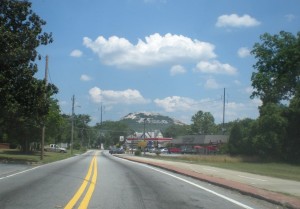
The further I drove out of the suburb of Decatur, the bigger and louder the trucks became, and the further from home I felt. I know it sounds cliché, but it was my experience. At about 40 minutes, I looked in my rear-view mirror and saw the mountain. Crap. I’d sung myself right past the place. I turned around and hoped I’d be able to use the bubble to navigate myself back. Even so, I wasn’t completely sure which turn to take to get to which gate. My usual half-lost-but-okay-with-that self was fading a bit as the monster trucks seemed to crowd nearer to my little Acura at stoplights.
I found my way back to the village of Stone Mountain, and wound through the streets toward the stone. After a couple of wrong turns within the park, I located the right parking lot and a sign to the trailhead.
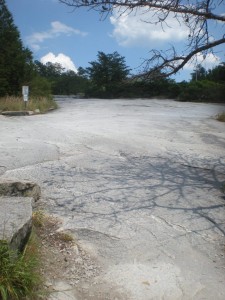
Which wasn’t much of a trailhead. Just a stone face. I paused for a moment to see where other people were going. And they were going up. Straight up the stone. I followed them, interested in a new adventure, and struck by the really strange geology of the place.
Green scrub reached out, sending fingers of scratchy brush along the stone face. Trees grappled with the ground, finding a hold. Great swaths of smooth stone were exposed from the thunderstorms that hit the place regularly.
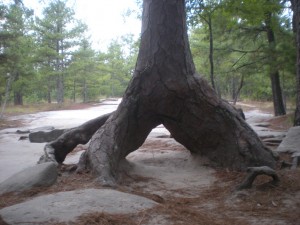
Bobbing along through the scrub, I looked around, side-to-side, up and down, taking it all in. This wasn’t so bad. Strange and all, but still… And then, about 100 yards in, I froze a little inside.
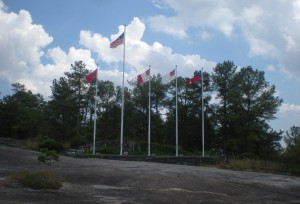
Yes, I know the Confederate battle flag is a symbol of independence; of rebellion. But where I come from, it means more than that. For a lesbian alone in the woods, it means quite a lot. My ex-girlfriend of 4 years was from the south. From Alabama. And she’d tried to explain the flag’s significance. I’d never really understood completely. It was like trying to understand the utility of the pink triangle.  I was curious, but uncomfortable. I looked over at the display of flags, considered stopping, and then sped up, happy to move out of the clearing, and wondering what else I might find.
What I found was a moonscape. It is, quite literally, like nothing else I’ve ever seen. The “mountain†seemed to be dropped out of the sky, or left behind by an incomprehensively large glacier.
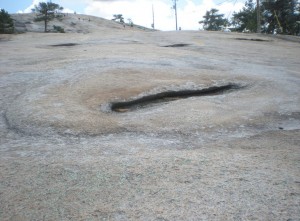
Pitted and strange it stood, as people, like ants, climbed its face and carved their loyalties into its side.
I climbed with them, wondering if they could sense my unease. I climbed with trail runners, and German tourists. I climbed with families, black and white, who seemed either oblivious or unconcerned with the blatant history of the place. I wondered, blithely, whether I’d take my children to an anti-gay monument to go hiking.
The top of the mountain is large, and flatish, the edges dropping dramatically to the greenbelt below. I did a circuit, looking over the side, wondering where the Confederate generals were carved. Until I found what I was pretty sure was the place, based on the grand, grassy viewing area below.
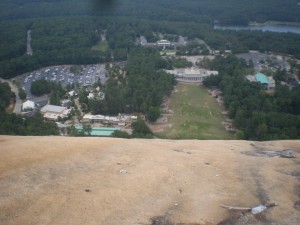
And the gondola platform.
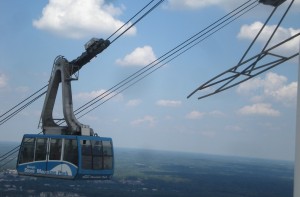
With the gondola shuttling people from the ground to the top of the stone. For what, I’m not sure. I’ve ridden the tram in Portland just to say I rode it, and to see the views on the way to Oregon Health Sciences University. Maybe it’s kind of like that. I’m not sure. Or like riding a ski-lift to the top, in order to see the view. And I have to say that the views from the top were spectacular. It was as though I was looking down on the city from a meteor. It’s possible that I was.
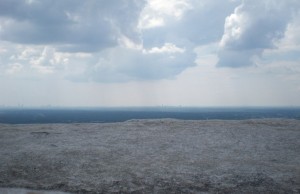
The place was strange.
Have I mentioned that? The geology alone was strange enough. Smooth sections, then great pits, then strange bumps adorned the surface.
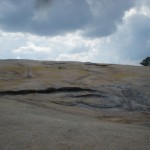
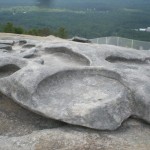
Normally, I’d find a quiet spot, sit, and commune with nature for a bit. But I felt unsettled in this place. It reminded me of the feelings I’ve had when I’ve visited prisons. As a 6th grader on a field trip, or an attorney for the state. There’s a violence in the air. A stripping away of something. A deep unrest sat about the rock, and I couldn’t tell whether it was the people, the weather, or the place itself, churning with a displeasure. I watched the skies change, and the vultures circle. And then I made a break for it.
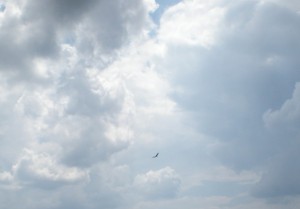
As I jogged down the stone face, the rain started, dotting the thirsty surface, and making everything incredibly slick. Only once did my shoes fail. On the steepest part, I slipped backwards, arms flailing out to grasp the handrails that jutted from the steep ground, waiting to catch unwary visitors.
When I reached the flags again, I decided to stop. The rain was coming down lightly, and my curiosity was even greater than before. I carefully read the placards in front of each flag, considering the combined history. The frustrated history of mistaken identity: Stars & Bars was changed to the battle flag, so as not to be mistaken with Stars & Stripes in a fight. The battle flag incorporated into the white field of the second national flag, which had to have a vertical, red bar added later, so as not to be mistaken for a flag of truce.
That’s a rough history for a movement. Seems a little confusing. I tried to commit it to memory, as I walked the last bit of the trail to the parking lot, past the African-American families headed up the mountain with beach chairs under their arms.
Before I left the park, I wanted to see the carving. I know very little about the Civil War, other than I was taught that it was about slavery, and my ex was taught that it was about trade embargos. I couldn’t tell you who the heroes of the war were, or where the important battles happened. But I still wanted to see the generals carved into the side of the stone.
I drove around the edge of the park until I saw a sign for the plantation and the “memorial lawn.â€Â It sounded promising. I walked past the boarding area for the gondola, where Star Wars music was being pumped like IV fluid to the excited families waiting to fly to the top, through a whitewashed colonial-style building that vomited air-conditioning into the Atlanta heat, and out onto a viewing area.
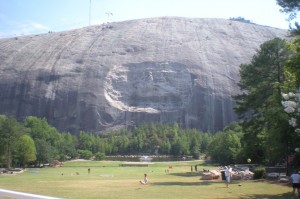
Stonewall Jackson, Robert E. Lee and Jefferson Davis rode across the face of the rock, their horses given equal billing on the informational signs.
I stood there, battling my fight or flight response. Fascinated. Petrified. Now, I’d like to make it clear that I’m an intelligent person. That I’m fairly rational. That I have deep interest in things that are different from my experience. I often seek these situations out, ready to confront my unease. But here, the unbelievable discord of the place crept into my cells. It still does when I think back on it. And I couldn’t find a way through it.
So I tried the nature path. The path led past flags of the confederate states. Scarcely little information was provided. Too bad, really. I was happy to learn more. But I’d have to do it online. I walked down to the front of the lawn and back around. I saw the scenic railroad cars filled with tourists. I saw the high-ropes course and the recreated “Crossroads†town. I saw the white families playing volleyball in the shadow of the mountain, and the young black men wearing “Stone Mountain†polo shirt uniforms as they staffed the attractions.
And then I left. Uncomfortable, but curious. And excited to talk with my Atlanta friends about what all I’d observed – sure I was missing some major dynamics that would help it all make sense. (In fact, as I write this, I’m sure there are people who will be willing to tell me how I got this all wrong, and why, exactly, this is understandable. And probably how racially and socially insensitive I am. That’s great. I’d like to know.)
Only, when I got back to the house, my Atlanta friends looked at me like I was a small child, unable to really understand. “Am I missing something?â€Â I asked, after describing the black workers and picnicking families.
“Hmmm,†is about the extent of what I got in response.
I tried again a few days later with another friend who had grown up there. “We’re thinking of going to the laser show at Stone Mountain. Want to join?â€Â The Stone Mountain laser light show is legend. Confederate glory lasered on to the face of the mountain and set to classic rock. According to the website, there also seemed to be some kind of tribute to Elvis. My friend was not interested.
“It’s just a bunch of rednecks,†was her response. She didn’t go much beyond that when I probed further. I didn’t find that response especially helpful.
It wasn’t until I posted about my experience on facebook that I got anything more. A law-school classmate who had grown up in Atlanta, and happened to be African-American, responded to my “am I missing something here?†post.
“No, not missing anything. That kind of crap is just so engrained there that people don’t notice it … It’s still very much the old south for much of the population mentally. Took me leaving to realize how truly creepy the laser show is (or even just the carving by itself). Like I said, issues.â€
Indeed. When I googled Stone Mountain, I found out that the man who carved Mount Rushmore had originally been involved in the carving of Stone Mountain. Interesting enough. I also found out that the KKK had re-org meetings on the top of the place. You know right around where the tram lets people off to visit the gift shop. And the snack shop.   I think maybe society has some issues. Or maybe I have some issues. I don’t know. But, for the first time, I found myself unable to understand. Unable to come up with some storyline that made sense of what I was seeing. But I guess it made sense to the German tourists. I don’t know. I just don’t know.
July 26, 2010 3 Comments
Carriaged away
Over the last year, I’ve begun to play with the idea of groundlessness. At least that’s what Pema Chodron calls it. She’s a famous, respected Buddhist nun. I’m a wanderer. Or I have been. So, without really meaning to, I’ve been on a spiritual journey, becoming familiar with the unsettled feelings that come with not having a home. With not knowing, exactly where I’ll be sleeping in a month or a week or a day. Sometimes I’m tied up in knots, anxious over the unknowing. Other times, I’m light, carefree. I land on my feet. I have amazing friends who have taken me in and put a roof over my head. I have family that would shelter me for as long as I need. I am fortunate.
The day before I left Italy for Atlanta, I was in a fit of groundlessness. Both of the places I’d planned to stay in Atlanta had fallen through, and then reemerged. When I left Italy, actually got on the plane, I didn’t know where I’d be staying when I landed. I sent an email to both of my friends asking them to talk amongst themselves and let me know where I should tell the taxi driver to drop me.
I checked my phone as I waited in the customs line in New York, and found that I’d be staying with my friend Kelly for a few days. I’d camp in her attic room – in June – in the Atlanta heat – without air conditioning. Then I’d transfer over to my friend Linda’s place, passed around like a smiling football. This was fine by me. I’m a pretty easy traveler. Not a lot rattles me, and I’m happy to sleep almost anywhere.
Kelly was set to pick me up at the airport when my late-night flight arrived. That changed, though, around hour 3 of sitting on the tarmac in Ney York. Hour 3 of sitting between 2 giant guys, after I’d traded my specifically selected aisle seat with a woman who wanted to sit with her daughter. “I bet this isn’t what you had in mind when you switched.â€Â She was right. I pick my seats very specifically. At this point I’d been traveling for about 26 hours. I talk about culture shock pretty regularly, but sitting between two big black guys for three hours, in a hot-ass, non-moving plane, trying to make small talk about a church conference was a seriously challenging re-entry.
When we finally made it to Atlanta, I was in an okay place. I was channeling my father, ready to figure out how to get a hotel room in the area, and take the shower that I’d been dreaming about for about 12 hours.
I cruised to the front of the plane when the seatbelt sign went off, waved to some of the friends I’d made on my Pisa NYC trip, and booked-it to baggage claim. Where I proceeded to wait for over an hour. Long story short, I ended up filing a lost-baggage report, and receiving a little toiletry bag from the airlines. It was nice. It even had a t-shirt for me to sleep in. As I filled out the report, the agent asked me to describe my bag. “Point to what kind it is,†she said, handing me a laminated card, and smiling kindly.
“It’s a backpack.â€Â I pointed at the diagram and handed it back to her.
“Oh, did you check oversize? That’s where backpacks go.â€
No, no I had not checked oversize. My bag was not, in fact, oversized. So I signed my report, just in case, took my little gift bag and headed to the oversized baggage area. My little bag, in its friendly, green rain cover was there among army duffels, and weaponry.
Clinging to my post-bag-retrieval high, I sauntered up to the bank of reservation phones to book a hotel. I studied the colorful pictures, and familiar hotel names. My dad was a traveling sales man, so I grew up spending family vacations in hotel rooms earned with frequent flier miles and points. Each logo evoked a specific emotion or memory of sandy beaches, and amusement parks.
I called through the friendly logos, finding each of them booked. Evidently, the airport had been practically shut down for two days due to the thunderstorms that had kept us grounded in New York. Stranded travelers had already filled the best hotels. Around the time I was calling my 10th hotel, I started making friends with the other travelers standing in front of the phones. We warily traded information: All of the Holiday Inns were booked, the number for the Comfort Suites was incorrect.
And then we all found an opening. I can’t even remember the hotel name, but it was close, and it had rooms. One after the other we called, booking whatever we could, happy to get on a shuttle and get some sleep. It was 1AM and we were collectively exhausted.
We made our ways to the shuttle area and waited. When the van pulled up and the doors opened, we stood back to let the others off.
“If you are going to Ramada, don’t. It has bedbugs and mold.â€Â A group was piling off, clearly jacked up on adrenaline and drama. We weren’t headed to the Ramada. We were headed next door. I tried not to think about how far bedbugs could travel, and whether mold would matter if I was spending 7 hours in the room…
The hotel was dingy, trapped in the early 80s. We waited outside a semi-secure vestibule large enough for 2 people, and stifling in the Atlanta heat – even at 1:30AM. Through bullet-proof glass I paid my $69 and received my key. The desk clerk pointed to the room closest to the street, and across from the pool/vending/front desk. All I could think about was a shower and a pillow.  My carefree traveling self was fading, slowly replaced by a character from Planes, Trains and Automobiles.
I keyed in, looked around, and stuck my head back out the door to give the thumbs-up to the others who were still waiting for keys. We’d wondered whether we’d have better luck across the street at the Highland Inn, or something like that.
Backpack balanced on a chair; shampoo in hand, I headed into the bathroom. And found that there was no hot water. None. I let the shower run, hoping it would warm up. I jiggled the handle and tried the sink. Zero. I thought feebly about asking for another room, but I the bed’s tractor beam pulled me in, and I passed out on the way to the door. I’d shower in the morning.
I didn’t move for about 6 hours. When I woke up, it was still with thoughts of hot water . Which did not exist. Not in my room, at any rate. No matter, Kelly was coming, and I could get a shower at her place. I packed up and waited for her call.
“Hi!†came her chipper voice. “I’ve got a great day planned for us. We’re going to head to coffee, then to breakfast, then to a meeting, then somewhere fun, and then home tonight. Make sure you get a shower. â€Â Crap.
It’s been a while since I took a submarine shower. I’m not so good at them. Fortunately, halfway through the chilly ordeal, the hot water appeared, out of nowhere. I did a little dance, and scrubbed a couple of days of bus, train and plane rides off of my body.
I checked out, and thought about how mildly grumpy I was that I had to pay for a crap-ass hotel room. Fortunately, I’d be spending the week with people I loved. I tried to focus on that, not wanting Kelly to know how un-great my night had been.
When Kelly arrived, it was with some news. She’d run into her neighbors on the way out of the house.  They were headed to the airport for a 3-week vacation. That meant that their carriage-house – a beautiful space with a full kitchen and bathroom – was empty. Quick-on-the-draw Kelly had secured the space for me.  She was a little apologetic when she described the place, afraid that I’d be disappointed not to stay with her. But the idea of my own bathroom and air conditioning was a dream.
We spent the day tromping around the city, eating, drinking coffee, and catching up. When we rolled up to Kelly’s place, and she pointed to the neighbors’, I laughed.
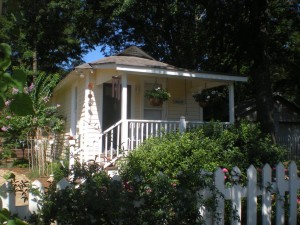
It was more beautiful than anything I could have planned. Nestled into a gorgeous backyard, with its own porch and swing, the carriage house was perfect. I crunched up the gravel drive, through the white-picket-fence, and opened the door. The burst of cool air that met me at the door made me laugh again. Kelly headed to her place, and I set to unpacking. I drew a bath in the clawfoot tub, and made some tea on the stove. Then I kicked back in the oversized chair, thinking about the fact that Kelly would never have run into the neighbors if my plane had been on time. I drifted off, smiling about the $69 I’d paid for the week-long stay at the carriage house, and knowing, once again, how wonderful groundlessness can be.
July 23, 2010 2 Comments
Half-buried
Italy is old. It has an ancient feel about it. Yes, I know everywhere is old. I know there were native peoples in the US thousands of years ago. But, somehow, Italy feels different. Like the land has been dealing with foolish people for a very long time. You know, like the Roman Empire, and whatnot. People determined to bring about their own destruction through over-estimation of their own powers.
Now, I’m not saying that’s what happened at Pompeii. It’s not like the people there angered Mt. Vesuvius with their self-absorption. By all accounts, it was an average place, with its bakeries and villas and brothels.   Humblingly so.
The day we visited Pompei, the Ant and I got up early and caught a bus into town. Unfortunately, we missed our train by about 2 minutes. The guy at the ticket counter sold us something that looked different than the usual tickets.
“Are you sure we didn’t buy bus tickets?â€Â The Ant wasn’t at all sure about these new passes. “I think you should ask.â€
A quick question confirmed that the passes could be used for both buses and trains in the region. That was great, but the next train wasn’t for several hours. We walked across the street to our favorite tourist information office to see what our favorite tourist information officer could tell us.
“Alora, you can take the bus at 11:05.â€Â Crap. That was still 2 hours away. “Aspetta. Wait. There is one at 10:05, right out front.â€
We grinned, thanked her, and left. We had just enough time for breakfast at our favorite gelateria/coffee bar.
With pastry in our stomachs and caffeine in our veins, we ventured into a tabacchi to buy stamps. We were really feeling good about our ability to get around and get things done.
At 10:00, we boarded the correct bus, picked out the best seats (we’d ridden enough busses to know what the best seats were) and settled in. When we pulled out at 10:05 there were only about 5 of us on the bus.
Along we drove, through the countryside, and through cities. Young boys got on and off, eying our bags hungrily. The cities got grittier and grittier, with unsurprising names like “Angri.â€Â The ride went on for what seemed like an eternity. I got up to check with the driver.
“Andiamo a Pompei, si?â€Â Nothing. “A Pompei?â€Â He nodded and grumbled a bit. I returned to my seat to scour my Rick Steves section for clues.
There are times when my trusty guidebook is super-helpful, and times when I could throw it in the fire. For the most part, our trip to the south wasn’t greatly aided by the guidebook. Our day in Pompei was no exception. Rick had some decent information on how to get to Pompei from the north, but the approach form the south had nothing. His description told me that if we got off at the train station, we’d be super-close to the entrance to the ruins. I checked the name of the station, and figured that if we could get off somewhere close, we’d be good. I mean, how big could Pompei be?
So the answer to that question is that Pompei is a kind of suburb of Naples. It’s big. When the bus driver stopped and announced “Pompei,†looking back at us, I got up and took the Ant with me.
I could have asked if this was the “stazione†stop, but I didn’t. Frankly, I was tired. I was tired of thinking in a foreign language.  I was tired of formulating questions, practicing them and then bungling them with less-than-helpful bus drivers. I was tired of the shrugs and the grunts and the anxiety that comes with rejection from strangers. Not that it was always like that. Just that it was always a possibility. And I was tired.
So, we got off and started walking. There were signs for the station – in the direction that the bus had driven. We followed them for maybe 5 minutes until we came to the “Centrale†station. This wasn’t the “Scavi†station that Rick had mentioned in the guidebook. I confirmed with a cabbie who wanted to give us a ride. We were 3 Kilometers away from “Scavi†and he’d gladly take us there for 10 Euro.
Forget it. I looked at his map, and thanked him. Then we took off, walking through the streets of modern Pompei. It was still morning, and fairly cool. Even so, I think I mentioned to the Ant how much I’d always liked the phrase, “sweating freely.â€Â I’d grown accustomed to having my jeans soaked through with sweat, and my wool t-shirt damp at all times. It reminded me of Aragorn running through the hills on a great quest in the Lord of the Rings. Yeah, I’m that kind of crazy.
We walked for about 30 minutes, following signs for “Scavi†and trusting that we’d know the ruins when we saw them. According to Rick, we’d hit the ruins before the scavi station. We walked past huge churches and interesting apartment complexes.
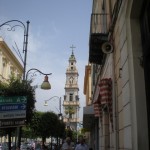
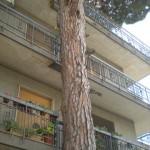
We greeted young men (I swear we saw 3 times as many men as women in Italy. I don’t know if the women are all working, or just at home with the kids, but the guys were out wandering, and drinking coffee), who all smiled at us kindly.
Lemons were everywhere. I knew lemons were an important product in the south, but in Pompei, the were seriously everywhere.  Rotting bags of them littered the street and huge, obscene fruit hung from carts.
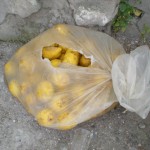
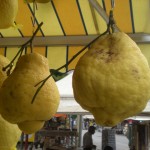
We stopped periodically for water, and I commented on how the heat really doesn’t bother me, and how important it was to make sure we stayed hydrated. “Six ounces every 15 minutes,†I sang. A familiar refrain to my softball friends.
By the time we reached what looked like a tourist area, we were both a little tired, and more than a little ready to be there. “Scavi,†read a sign, pointing up a driveway that led up a hill, and out of sight. We’d seen several of these signs along the way, often pointing in different directions. We looked at each other and sighed. It seemed like were almost there. In the back of my head I wondered what had gone wrong, and how we’d be getting home. Oh well, it always worked itself out.
Up the hill and around a corner, we found the gates to the ruins. As we approached, beautiful displays of even more lemons invited us in.
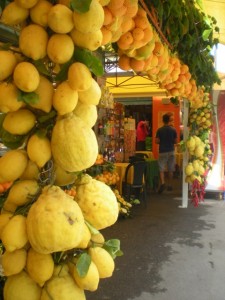
As did a “local tour guide†in his over-sized, crumpled ballcap and aviator glasses. “English? Wait 10 minutes I will organize an English tour. It will be much more affordable,†he barked at us.
“No, grazie.â€Â I wielded my familiar vendor response to little effect.
“English?!â€Â He was demanding. “Please, go this way and purchase your ticket. I will arrange a tour.â€Â The local tour guides, and even random people looking for a handout will masquerade as helpful staff members. This guy was pointing us to the ticket office. Fortunately, Rick had warned us about this, so we were prepared. Others seemed baffled.
Once we had our tickets and free map (thanks to Rick’s excellent information about where to get one), we hit the WC. The entire time, we listened to the barker trying to organize the tour. “Next tour English with local guide. Next tour in English! Please, purchase your tickets! This way…â€
Feeling just a little superior in our knowledge, we emerged, skirted the guide and headed to an overlook area.
The last time I was in Italy, it was the off season. O-F-F. There aren’t a lot of tourists visiting Rome and Venice in November and December. I’d like to keep it that way. Standing at the Pompei overlook, I flashed back to a CS Lewis novel I’d read as a kid. “The Silver Planet†was this great sci-fi story about, as I remember it, a man who goes into space for an extended period of time, living on another planet. The part that came back to me now was a scene when, after a long time away from home, he watched unfamiliar creatures come over the horizon, hairy and gruff in their manner, speaking a harsh, unbeautiful language. It took him a moment to realize they were humans speaking English.
All around me, the beautiful melody of the Italian language disappeared into a sea of shouted names, pushing, scrambling as though the ruins would somehow be used up, fear and scarcity the dominant energy.
“Let’s get inside, shall we?â€Â I could hardly bring myself to look at the Ant. I just wanted to disappear.
Once out of the crowd, I took a moment to look around. Pompei is amazing. It really is “You’re going to be amazed, girl.â€Â I’d been told by my buddies that this would be an amazing experience. But it’s hard to prepare for something like Pompei. In fact, I’m not sure there’s a lot I can say about it.
We walked through the forum, along the streets. We noted the stepping stones that allowed chariots through and provided a path for pedestrians when the streets were flooded for cleaning every night.
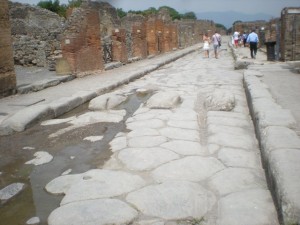
We looked into the distance at the crater of Vesuvius, and imagined the plume of ash that had risen from it. And fallen where we were standing, killing and preserving everything. Leaving the record we were now snapping pictures of.
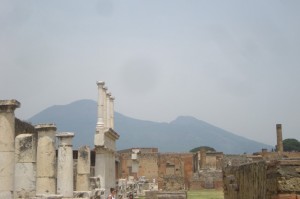
We saw bold-colored frescoes and strong mosaics.
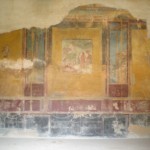
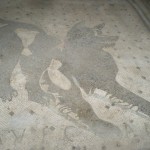
Shrines and fast-food joints.
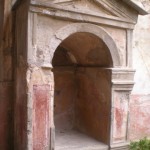
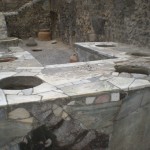
Huge pots, half-buried, and intact dotted the rooms.
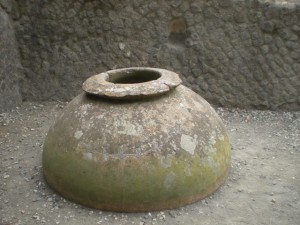
And tourists crowded along the fence that protected the remaining artifacts. The tools, and art left behind. And the people. The plaster casts made from the spaces left when the bodies of Pompeians had decomposed.
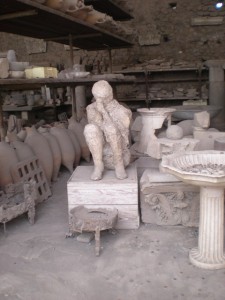
I took a picture of one of the most famous and left the rest to be mobbed.
My favorite part of the site was the public baths. From the beautiful outdoor gymnasium,
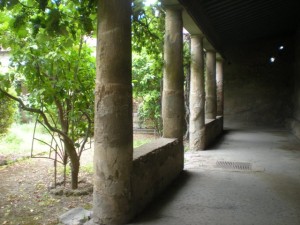
To the immense steam fountain inlaid with the names of the politicians who paid for it.
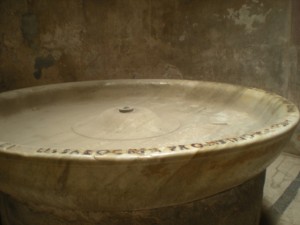
The baths provided an intimate look into the life I would have been most drawn to in Pompei. At once physical, artistic, and engineered, they intrigued me with their temperature-controlled double walls and bronze heater. They were so well preserved that they reminded me of images of the gym on the Titanic.
This place really was amazing. We wandered around, taking in the 2,000 year old lead pipes, and the water-towers. The double-boilers that kept food warm. Then we took in the snack shop. And the Powerade. Pompei was cool, but it was also hot. Really, really hot.
And I swear it had ears. Just like Venice it heard me bragging. And it landed me on my ass. Even after drinking several bottles of water and a Poweraid, the ground was shifting under me. My statement about not being affected by the heat caught in my throat.
“So, what do you think about heading back?â€Â I wasn’t usually one for leaving anything unseen, but I wasn’t used to having my body betray me, either.
The Ant looked at me. “I wouldn’t be upset if we headed back.â€
“Okay, then I think it’s time. My body is rebelling.â€Â Along with the baths, I’d really wanted to see the brothel, and its frescoes that served as a kind of menu of services. But at that point, even the dirty frescoes were forgotten.  All I was thinking about was finding the “Scavi†train station that Rick Steves had promised was so very close to the ruins.
I consulted the Pompei section of Rick’s book that I’d torn out and put in my pocket. I reversed the directions from the station to the ruins, and determined that we needed to go right. After walking for about 10 minutes, it was clear that something was wrong.
“Maybe we should go in and ask,†suggested the Ant, pointing to a tobacco shop.
“Maybe.â€Â I was still having an attitude crisis about having to ask directions in Italian. Still, I walked in to the tiny shop and waited behind a couple of local guys to talk with the shopkeep, who was sitting on a stool behind what looked like bullet-proof glass.
“Prego. Dove il stazione?â€
All three guys answered. Waving their arms, they pointed us back out and to the right. On the way we’d been heading.
“Grazie, ciao!â€
I walked back out to the Ant. “Yeah, they said to go up here.â€Â  Neither of us was too excited to keep on, in the opposite direction from the “Centrale†station we’d been at earlier in the day. But, on we walked, wondering when we’d see the station.
There were scarce few people on the sidewalk, giving us little opportunity to confirm that we were, indeed, headed in the right direction. So when we saw a man getting into a car just ahead of us, the Ant lunged forward, suddenly inspired.
“Staztione?â€Â she ventured.
He responded in rapid Italian.
“No parlo bene. Mi dispiace,â€Â I interjected. We weren’t in any space to work this out in Italian.
“English?â€
“Yes. Where is the train station?â€
He pointed back the way we’d come. “Three kilometers.â€Â Damn.
“Stazione Scavi?â€Â Rick said there was a Scavi station close to the ruins.
“Where are you going?†he asked.
“Salerno.â€
“No, Stazione Centrale. There is a Circumvesuvia station here, but it does not go to Salerno.â€
Shit. That’s the line Rick had talked about. I hadn’t considered that it wouldn’t go to Salerno.
“Okay. We know Centrale. Grazie. Ciao.â€Â Well, at least we knew where we were going. It was just another 20 minutes we’d added by walking this way in search the Scavi station. We pulled out our water bottles to hydrate. Our guide got in his car and began to drive off. I was a little disappointed. After our excellent experiences in Potenza I’d really rather expected that he’d offer us a ride.
Then he pulled up to us and got out of the car.
“There is another station closer. Torre Annunziata Centrale.â€
“Come?â€Â I caught a couple of the words, but this was a crazy name.
“Torre Annunziata Centrale.â€Â He pointed back the way we’d been heading.
“Okay, how far?â€Â The idea of another wild goose chase wasn’t interesting to me.
“Maybe 15 minutes if you walk. But 2 minutes if I drive you.â€Â He opened the back door.
“Grazie.â€
We climbed hungrily into the air conditioned interior of his black sedan. I nearly told him he was an angel, but thought I’d hold back to see if he slaughtered us, first.
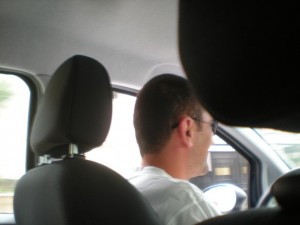
“Is this your first time to Pompei?â€
“Yes. Are you from here?â€
“Yes. Well, from Naples. It’s all the same.â€Â Oh really. That explains how we could be walking for an hour in one direction and not reach the end of the town.
“Thank you for the ride. Molto gentile. What is your name?â€
“My name?â€Â He seemed amused. “Angelo.â€Â Of course it was. Of frickin course.
“Grazie mille Angelo.â€
“Niente.â€Â How could he say it was nothing. It meant so very much to us, strangers who were so very tired.
He dropped us at a little train station and we headed inside, waving goodbye. I looked up and noticed a street sign. A brown one that had a picture of ruins on it. And said “Scavi.â€Â No way. And it dawned on me. Scavi meant ruins. Yes, there might be a “Scavi†station, but all the signs we’d been seeing pointing in different directions weren’t signs to the station. They were signs to the ruins. Cazzo. I almost laughed at myself. Almost. But I was too tired.
We checked the departure board. The next train was leaving in 20 minutes. Just enough time to pee and find the right platform. And to learn the name of the station.
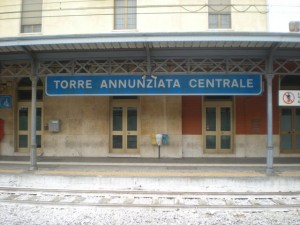
No way. I didn’t need to know the name of the train station.
July 1, 2010 1 Comment
Not-so-free beach
I spent a couple of afternoons on free beaches in Salerno. Carmine had pointed to a few of them on our first day orientation drive around the city.
“How are the free beaches?â€Â I’d asked. The idea of paying to sit in the sand is a foreign concept to someone from Oregon. The beaches in the state are all considered public. All of them. Every grain of sand.
In Salerno, however, probably 80% of the sand is contained within fences and barriers, cordoned off into color-coded parcels marked by striped umbrellas.
Early into the trip I’d decided to take a run over to one of the free beaches that was halfway between our apartment and downtown Salerno. It was about a 20 minute run, perfect on a hot day. I packed up my towel, water bottle and book. I left anything valuable, including my camera and ID home.
When I returned with my aunt, a week or so later, however, I made sure I had my camera. The scene was just too rich to miss. I’d risk it.
The walk to the strip of beaches took us through the underground passage for the under-construction train station, along stretches of abandoned private beach resorts, and past an ancient lighthouse.
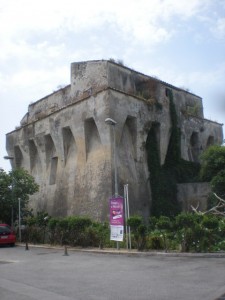
The day was really quite hot, and the humidity was pushing us into the realm of uncomfortable. We laughed as we walked past a disembodied room fan on the sidewalk.
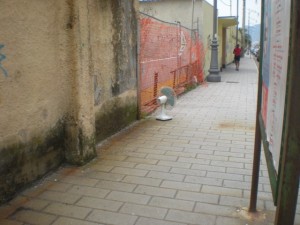
The Ant was a trooper throughout the trip. Whether walking too far along the beach, or dragging a suitcase over the bridges of Venice, she only occasionally asked me if we were there yet. Today, though, I could sense that she was wondering whether I had sent her on a death march.
“We’re almost there,†I said, pointing at the cabanas we were passing on our left. “We just have to go past these ones with red roofs, then some blue ones, and then the other red ones.â€
Almost there. What it really meant was that I knew where we were and where we were going. Not that we were, actually, close. The Ant knew this.
“Okay,†she nodded. I knew she wasn’t convinced.
Forty-five minutes, and several water-stops later, we were there, at the free beach, staking out our spots, and taking in the scene.
Free beaches are free for a number of reasons:
- Nobody cleans up the trash that is washed up or left behind.
- There is no shade.
- There is no fresh water, either for drinking or washing.
- Beach vendors are allowed to walk along, and peddle their wares to anyone and everyone, relentlessly.
The vendors are easily enough dealt with. A simple, “No, grazie†said firmly, and often, even over the top of the low-toned pitch, will almost always work. It’s just that the process has to be repeated every 2-7 minutes as a new vendor, always a young man, and almost always a dark-skinned African immigrant, wanders by, tries to catch your eye, moves in close, and presents his product. Sometimes it’s beach toys. Other times clothing, or bolts of fabric. Once in a while it’s jewelry or small pieces of art.
They start in Italian, then move to English, or German, or whatever language they determine will garner the most response. With each firm, “No, grazie†I lament my inability to connect on a human level. Eye-contact always prolongs the interaction, serving as a kind of affirmative response to their wares.
In the US, I will usually take the time to look a street vendor in the eye before saying, “no thanks.â€Â But here, in a less-familiar place, I feel unable to do so. And saddened by that reality. I also feel humbled. As I listen to these men, watch them comb the beaches for the few Euro they will make each hour, I am incredibly humbled by my ignorance. And my privilege. That’s not a word I use lightly, but it feels apt here. I speak one language. I know a few words of Spanish and a few of Italian. Not enough to get by selling garments on a beach. My fear of misspeaking gets in my way. Yet these beautiful vendors speak unabashedly with me, passing through their rotating vocabulary, hoping to hit on a language familiar to me. And here I sit, with the great good fortune to say, “no, grazie.â€
Today, though, the vendors were light, leaving us room to take in the vignettes unfolding before us.
What I had found most interesting on my first trip to the beach was the gender dynamic that was so heady. The boys were in one area, and the girls in another. There was one girl that ventured into the area up against the paid beach wall where the boys had claimed the shade. She had a bemused look on her face the entire time. Crouching inside the protection of her towel, as though she wasn’t sure how she’d managed to put herself there, and not entirely sure it was a good idea.
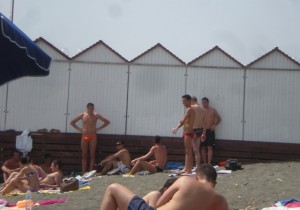
The rest of the girls were traveling in packs, venturing into the water, and out again, inching closer to the boys that were playing soccer in the foamy sand. Interactions between the genders were punctuated by raucous clashes: sand kicked at a girl, and the resulting screech.
More interesting, though, was the interaction between the boys.
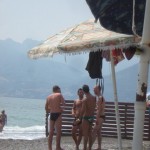
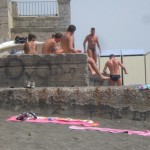
It has taken me a while to become comfortable with the overt sexuality that is part of Italian culture. It seems strange to some people, that the country that is home to the Vatican is so sexually charged. Yeah, it’s a little weird, but it’s there. And on the beaches, the sexual electricity that lies just below the surface was almost alarming to a kid who grew up in a country like the US.
Laying on my little towel, I peeked from under my hat and over my sunglasses to watch.
The four boys in front of me looked like they were maybe 19, maybe 20. Old enough to have the bodies of men, but still awkward in their bravado, adjusting their tiny bathing suits, and opting to let the sun reflect off of their wet bodies, rather than towel off.
They would take turns hoisting their well-tanned bodies from the sand and diving into the sea to cool off. They would emerge, and with a well practiced move, brush the water from their hair to good effect, leaving it spiky, erect, interesting. Then they would lie down next to each other to let the sun dry them.
The girls would scamper around the sand, pretending not to notice, adjusting their equally tiny suits and making sure the ball they were kicking around would drift into the boys’ line of sight every so often.
For their part, the boys seemed honestly disinterested in the girls. They took more interest in each other, leaning on each other’s shoulders, laughing together. At least most of them. Twice I watched as two older-looking guys came over and asserted their dominance – physically and directly.
First was someone who seemed to be a friend. His towel was positioned with the other 3 in front of me. In his racy red suit and shaved head, he was more muscular than the others. Throwing all of that muscle on top of one of the smaller boys, he crushed his body into the other, almost the way a wrestler would dominate an opponent.
Hips ground into the other, arms pinning the smaller boy’s arms above his head, the bigger boy laughed into his ear as the others watched. Then, when he’d decided the emasculation was enough, he rolled over onto his own towel, and all returned to normal. Except for me. I was a little scarred.
About a half hour later, as I was just getting over the first exchange, a much older and bigger boy with a tattooed leg, and longer shorts made his appearance on the beach. He was apparently known to many on the beach. “Nicola!†came the cries from different areas. It wasn’t clear to me whether he was loved or feared. Only that he was known. He made a wide circuit, strutting from group to group, his soft body a contrast to the younger, more athletic boys. His tattoo a brazen one, taking up the entirety of his left calf.
After spending time with the group along the wall, and kicking the soccer ball out of the group at the water’s edge and into the ocean, he came over to my boys. Only one of them was on his stomach. Nicola headed straight for him, and dropping his body down, placed one knee roughly in the other boy’s lower back, apparently trying to separate his hips from the rest of his body.
The boy screamed, actually screamed as Nicola pinned his arms to his side and laughed. The others looked nervously over, but they only watched as their comrade struggled fruitlessly to move out of the hold, crying out, “Nicola, basta!â€Â When he decided it was enough, Nicola released his hands, and pushed off of the boy, up to a standing position, still laughing.
The boy did nothing. He lay there, and adjusted his suit. Nicola greeted the others. It wasn’t a friendly greeting he received. Just a nod and maybe an embraced hand. Not like the hugs and heads leaned onto each other’s shoulders. This boy, this bully was both enforcer and violator. His presence was accepted, expected, but not appreciated.
Nicola walked away. He had no towel. He had no group. He had no girls looking slyly at him, or boys welcoming him. I didn’t see where he went as I gathered my towel and book and headed out.
On the way home from our beach excursion, the Ant and I stopped for an emergency gelato. Along the dingy street that led to the underpass, we ducked into a nondescript bar with a dark-browed man behind the counter. He peered at us, clear strangers in this locals’ bar.
We smiled our hellos, and moved toward the unpromising gelato case. The flavors were meager, and clearly not house made. But we were in a bad way, so it would have to do.
As soon as he saw us move toward the case, he melted. Whether we reminded him of family members, or he just liked gelato, too, he patiently waded through our butchered Italian, and soon enough we had lovely cones of respite. We sat in the cool shop and ate quietly, the World Cup showing in the background.
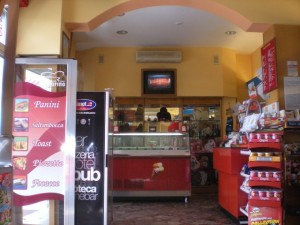
When we stood to leave, the shop-owner called to us in a friendly tone, and we waived, the familiar, “Ciao! Grazie!†tossed back and forth.
In the now-short blocks home, we walked, looking down the alleys that led from the ramshackle street to the beach. I pulled out my camera to capture a boat I’d noticed before. And, as I raised the camera, something caught my eye.
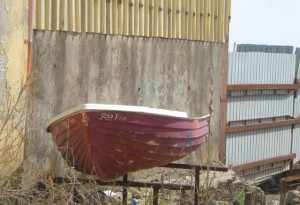
“Redfish.â€Â The white name scrawled along the dusty red hull of the rowboat rang out to me, the name of the lake and the beach where I’d spent my childhood summer weekends. The place where I’d played with the boys and watched the girls. The little boat smiled back at me, playful and comforting.
June 30, 2010 1 Comment


